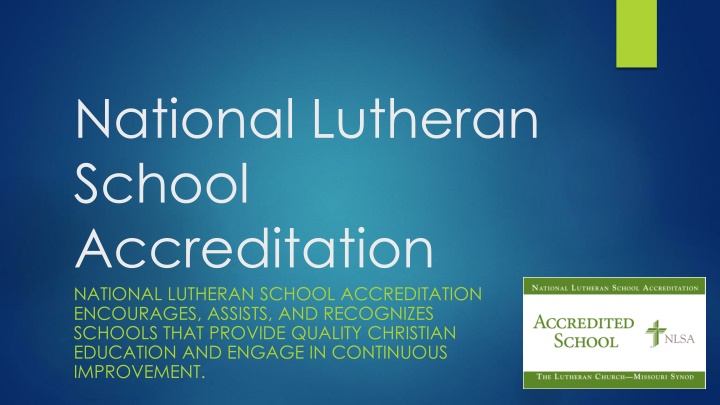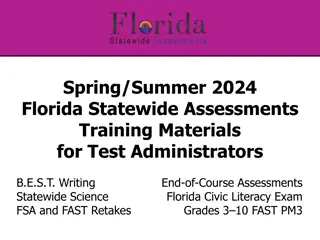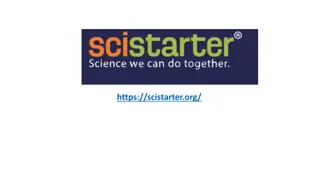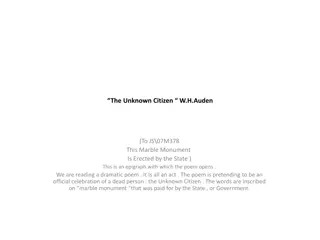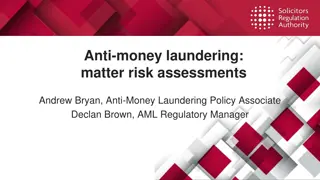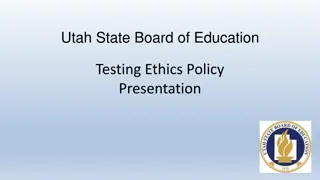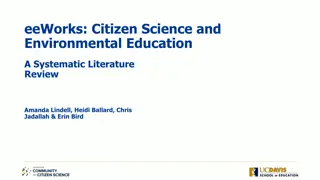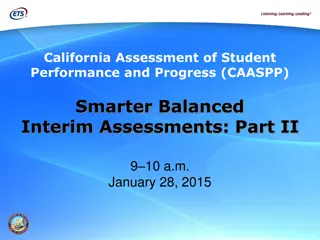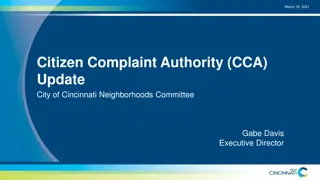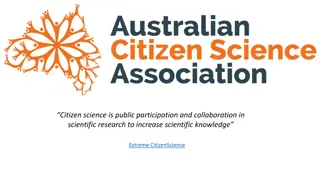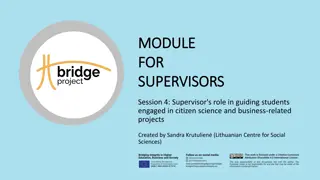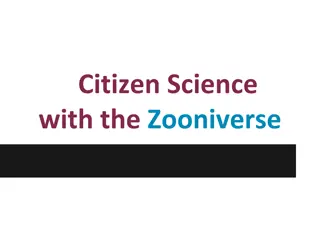Impact Assessments and Citizen Science Role in Implementation
This content explores the role of citizen science in impact assessments and implementation processes, focusing on the work of NEF, a UK-based independent organization dedicated to fostering a new economy and enhancing quality of life through innovative methodologies. It delves into the importance of citizen participation, capacity building, and co-production in shaping decision-making processes, community projects, and public service delivery.
Download Presentation

Please find below an Image/Link to download the presentation.
The content on the website is provided AS IS for your information and personal use only. It may not be sold, licensed, or shared on other websites without obtaining consent from the author.If you encounter any issues during the download, it is possible that the publisher has removed the file from their server.
You are allowed to download the files provided on this website for personal or commercial use, subject to the condition that they are used lawfully. All files are the property of their respective owners.
The content on the website is provided AS IS for your information and personal use only. It may not be sold, licensed, or shared on other websites without obtaining consent from the author.
E N D
Presentation Transcript
National Lutheran School Accreditation NATIONAL LUTHERAN SCHOOL ACCREDITATION ENCOURAGES, ASSISTS, AND RECOGNIZES SCHOOLS THAT PROVIDE QUALITY CHRISTIAN EDUCATION AND ENGAGE IN CONTINUOUS IMPROVEMENT.
Purpose of Accreditation Help all Lutheran schools improve. Help all Lutheran schools evaluate themselves based on their unique purposes. Assure a level of quality for accredited Lutheran schools based on national standards. Give appropriate recognition to those schools that complete the process successfully.
Vision and Benefits National Lutheran School Accreditation (NLSA) provides a service that empowers schools to develop and improve high-quality, Christ-centered education through a voluntary process.
Values Supported by NLSA Lutheran Culture Educational Excellence Continuing Improvement Innovation
Steps on Journey of Accreditation Phase One: Self-Study Phase Two: Team Validation Visit Phase Three: Continued Improvement
Key Participants in Your Journey: Administrator Teachers and Support Staff Lay Leaders Pastor School Parents NLSA Consultant & Team Captain
Preparing the Self Study Report: The Steering Committee Directs and Supervises the Work Committees complete the work which is reviewed and finalized by the Steering Committee The Self Study includes several parts: General Information Section Surveys of Constituents Evaluation of the School Based on Standards and Evidence Developing a school action plan
NLSA Standards Purpose The School is Purpose driven Relationships - The school demonstrates its Christian mission through relationships. a. School and Congregation b. School and Community c. School Climate
Standards Leadership - The school is governed and administered following written policy. a. Governance b. Administration Professional Personnel - A qualified and competent staff serves the school.
Standards Teaching and Learning - The school s Christ- centered curriculum, instructional design and assessment practices ensure teacher effectiveness and engaged student learning. Student Services - The school plans for and provides resources and activities that extend beyond standard classroom instruction. Facilities - Buildings, grounds and equipment provide a safe and healthy environment that serves to enhance student learning.
Self Study Details on Each Standard Required Responses Required Evidence Required Indicators of Success Rating General Indicators Providing Potential Evidence
Required Indicators of Success 1:01*The school s written purpose statement is rooted in Holy Scripture. 1:02*School leadership and staff members understand and accept the purpose of the school. 2A:01* The school is operated by one or more of the congregations of The LCMS 2B:08* A statement of nondiscrimination is evident in school-printed materials. 2C:17* The climate of the school flows from and supports the school s purpose.
Required Indicators of Success 3A:01* governing authority 3A:02* The operating organization has written policies clearly defining governing authority membership. 3A:03* The governing authority establishes written policies or administrative limitation that empower the administration in operating the school. 3B:21*The administrator demonstrates a personal Christian faith, a commitment to Lutheran education and a dedication to the teaching ministry of the governing authority. 4:01* All school personnel express and demonstrate agreement with the stated school purpose. The operating organization designates the
Required Indicators of Success 5:01* The teaching of the Christian faith is recognized as the major purpose of the school 5:02* The written curriculum has been developed and is being implemented for religion, mathematics, science, reading, language arts, social studies, art, music and physical education. 6:01* Services offered by the school meet or exceed federal, state and local requirements. 7:01* Facilities are well maintained, free from hazards providing for a safe and productive learning environment. 7:02* Facilities conform fully with all applicable laws and health, safety and building codes.
Required Evidence The written purpose/philosophy/mission statement Nondiscrimination policy School discipline code Governing board handbook or policy manual including policies relating to roles: board, administrator and pastor Latest copy of the annual LCMS Early Childhood and School Statistical Report The administrator s job description The school s staff development plan Nondiscriminatory salary and benefit scale
Required Evidence Written curriculum for all of the subjects taught at your school. (Early childhood centers need not segment learner outcomes into specific subject areas.) A current schedule for each classroom, indicating clearly which subjects (activities) are taught at which times. A chart illustrating what percentage of each school week is allocated each subject (activity) at each level. Compare this with state requirements. An analysis of the results of standardized tests administered at your school Standard Six Enrollment/Admission policy Volunteer handbook Crisis Emergency Plan School floor plan
Rating Other Indicators Analyze your practices and evidence Review survey results Study the indicator rubrics Come to a consensus for rating the indicator s implementation at your school Ratings are from one to four : 1 Not Evident 2 Emerging 3 Operational 4 Highly Functional
Sample Indicator 1:03: School leadership (administration and governing board) uses the mission statement as the foundation and reference for all planning. Schools must demonstrate with documented evidence and practice that they comply with the following to function at the operational level. Place an X in the boxes below which currently apply to the school. The school s purpose was developed in accordance with governance policy. The school s purpose is engaged, aligned and enacted with its vision, values, school goals, learner outcomes and student activities. The school s mission statement supports and aligns with the congregational mission statement. Place an X in the Rating Box with Reflects the Actual Condition of the School Highly Functional (4) Operational (3) Emerging (2) Not Evident (1)
Providing Evidence Since this is Evidence Based Accreditation, you must provide evidence to support every rating you give. This can be in the form of documents, survey results, pictures, or anything else that can demonstrate how the standards are being met.
Developing the School Action Plan Review School Mission Statement Standardized Test Scores (and other testing measurements) Surveys (see samples) Teacher Interviews The Standards Checklist All indicators which receive a rating of 1 or 2 should be addressed in the School Action Plan Other sources of data regarding the school and its programs
Goals 3-7 school action goals related to findings from the self- study process consistent with the school's purpose. A well-organized plan for school improvement that relates to the NLSA Standards by focusing on improved student learning, ministry enhancement or improvements related to programs, policies or facilities. Goals that are related to findings from the Self-Study process and are consistent with the school s purpose. Goals are statements of desired future conditions consistent with the school's mission and NLSA standards based on concerns identified by the school in its self- study process.
Strategies Strategies are aligned with school action goals and provide the vehicle (ideas, plans, actions, steps) for accomplishing the goals within a prescribed timeframe (targeted date). Strategies are specific enough to be measurable. Strategies take into account factors like time and cost. A specific person or group should be assigned to assure that a strategy is carried out. Strategies should describe when and how the outcomes will be evaluated.
Accreditation Checkpoints This is the suggested schedule for schools to maintain appropriate progress towards the completion of their self-study. 1. The consultant makes initial contact with a school before January. 2. The consultant makes an initial visit to school to meet with administrators, Pastor, Board members, faculty, committee members, and any other interested individuals.
Accreditation Checkpoints 3. The school will contact the consultant a minimum of once a month during the entire self- study process. The school administrator is responsible for providing the consultant with copies of completed work and appropriate exhibits on a timely basis according to the school s adopted accreditation schedule.
Accreditation Checkpoints 4. The school will report on progress and any concerns they have to the District Accreditation Commission (DAC) at meetings before the District Educator s Conference. Each administrator will have 15 20 minutes to present an overview of the work completed. You will be notified as to what items are to be presented at this meeting
Agencies That Co-Accredit With NLSA Florida-Georgia District Accreditation AdvancEd WASC (Western Association of Schools and Colleges) CCLE (Consortium for Classical Lutheran Education)
Consultant Contact Information Name: School: Address: Phone Numbers: W C Email:
Blessings on Your School Improvement Journey! NATIONAL LUTHERAN SCHOOL ACCREDITATION
